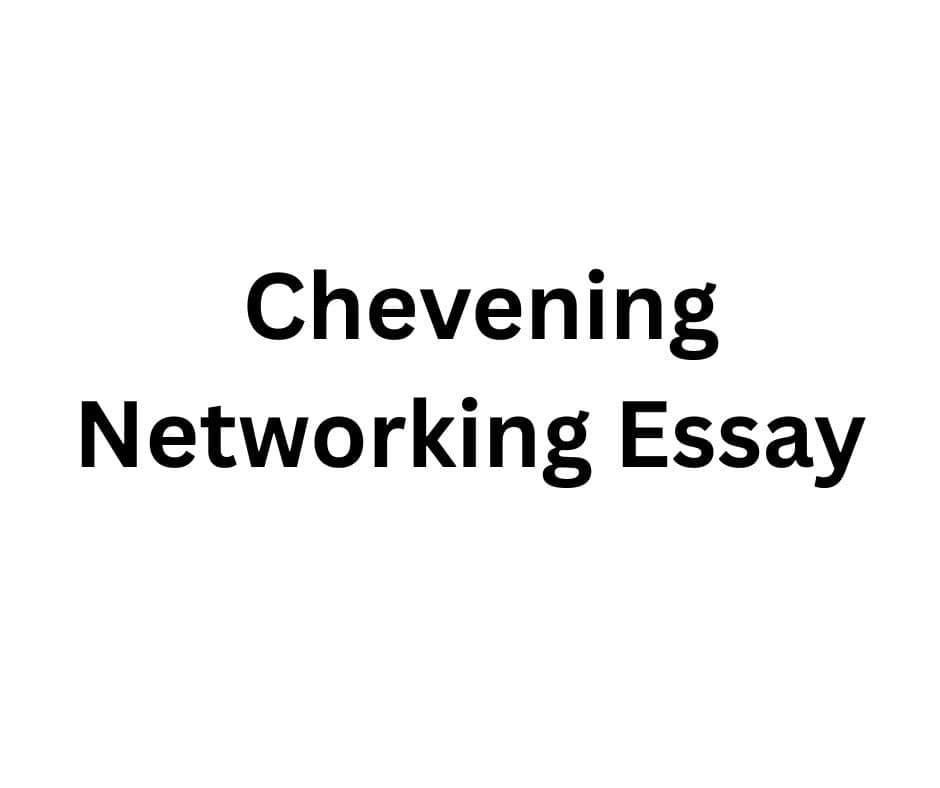Chevening Networking Essay:
Table of Contents
Chevening is seeking people with excellent networking abilities who can establish connections to exchange knowledge and effect change. Explain your approach to establishing and preserving connections in a business or educational environment.
For instance:
In my capacity as a policy analyst at the Ministry of Education, I organized a roundtable with representatives from government agencies, education NGOs, and teachers’ unions. The objective was to close the growing learning gap caused by school closures brought on by the pandemic. By sending out newsletters and setting up follow-up meetings, I made sure that there was open communication and ongoing participation.
My philosophy of networking is based on knowledge sharing and respect for one another. Through conferences and LinkedIn, I also keep up international connections, which I have used to benchmark and locally modify policy interventions from nations like Finland. These connections have broadened my perspective on the world and improved my work.
3. Study in the United Kingdom Essay
Question: Describe your reasons for picking the UK as your study destination and how the course(s) and university(ies) you have chosen will help you reach your professional objectives.
For instance:
The UK is the perfect location for my academic and professional development because of its internationally renowned educational system and diverse population. I am particularly drawn to the MSc in Public Policy at University College London, which offers modules on evidence-based policymaking and governance that are directly aligned with my goal of reforming educational policy in my home country.
The opportunity to study under esteemed professors and collaborate with peers from around the world will enhance my ability to craft inclusive, data-driven policies. The UK’s emphasis on practical learning through internships and policy labs also provides a platform for real-world application of theoretical knowledge.
4. Career Plan Essay:
Prompt: Chevening is looking for individuals with a clear post-study career plan. Outline your immediate plans upon returning home and your long-term career goals.
Example:
Upon returning home, I plan to resume my role at the Ministry of Education with a focus on integrating technology into rural classrooms. My short-term goal is to design a pilot program that provides digital resources and teacher training in underprivileged districts.
In the long term, I aim to become Director of National Curriculum Development, where I can influence education reform on a systemic level. By 2035, I envision leading a regional initiative to harmonize East African educational standards, ensuring cross-border recognition of qualifications and educational equity across the region.
If you’d like help tailoring your own Chevening essays or would like feedback on a draft, feel free to share details or text!
How to write a Chevening Networking Essay?
Writing a strong Chevening Networking Essay is about demonstrating that you can build and maintain professional relationships that contribute to mutual success, learning, and positive impact. Chevening places a strong emphasis on networking because scholars are expected to become future leaders, who must collaborate across cultures and sectors.
What the Essay Should Show
Chevening wants to see that you:
Understand the value of professional networks.
Have actively built and sustained relationships.
Can leverage these connections to influence change, exchange ideas, or grow professionally.
Will contribute to and benefit from the Chevening Alumni network.
Structure for Your Networking Essay:
Here’s a solid structure to follow (word limit: ~500 words):
1. Introduction (50–70 words)
Define what networking means to you.
Introduce your core message: that you’ve actively built a strong professional network and intend to expand it.
Example:
To me, networking is about creating mutually beneficial relationships based on shared goals and trust. Throughout my professional journey, I have actively cultivated connections that have enriched my work and led to meaningful collaboration. These relationships continue to influence my growth and advocacy efforts in public health.
2. Demonstrate Networking in Action (150–200 words)
Share specific examples of when and how you built or maintained relationships in a professional or academic setting.
Highlight the outcome of these interactions (e.g., a successful project, a policy influence, a partnership, a learning opportunity).
Check Also: How To Write Chevening Scholarship Essay
Example:
As a research associate at XYZ Institute, I organized monthly knowledge-sharing forums between university researchers and local NGOs. This platform allowed practitioners to inform academic research while gaining access to evidence-based strategies. One such connection led to a joint grant proposal that funded a maternal health initiative reaching over 5,000 women in rural areas.
3. Networking Strategies (100–150 words)
Explain how you sustain your relationships (e.g., consistent communication, collaboration, attending conferences).
Mention international networking if relevant (especially good if you’ve worked across borders or cultures).
Example:
I use a mix of digital and face-to-face interactions to maintain relationships. I actively contribute to LinkedIn professional groups, send quarterly updates to my network, and regularly attend webinars and workshops. My experience with the WHO internship taught me how to navigate multicultural environments and foster cooperation with colleagues from five continents.
4. Future Networking Goals (70–100 words)
Describe how you will build and use your network in the UK.
Mention how you’ll engage with the Chevening Alumni community post-scholarship.
Example:
At university in the UK, I aim to connect with scholars, professors, and policymakers whose work aligns with health equity. I plan to join societies, conferences, and mentoring programs to expand my network. After Chevening, I will remain an active alum, sharing opportunities, leading dialogues, and collaborating on regional development initiatives.
Tips for Success
Use real, specific examples with measurable outcomes.
Show mutual benefit—don’t just say what you gained.
Keep it professional. Networking is more than just “making friends.”
Highlight international, cross-cultural, or cross-sector interactions if possible.
Show that you’re proactive and intentional about maintaining connections.




